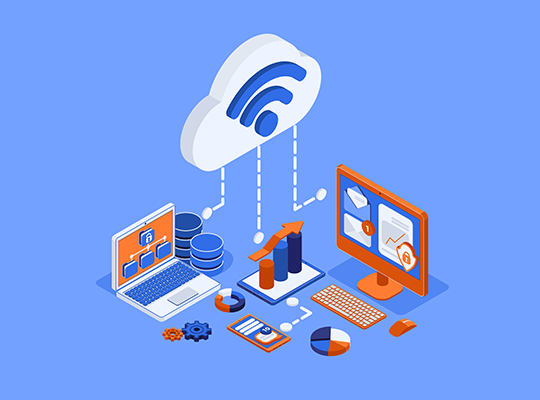The term "cloud computing" refers to the storage and access of data and computer services through the internet. It does not save any data on your computer. It refers to the on-demand availability of computer services such as servers, data storage, networking, and databases. The primary goal of cloud computing is to provide numerous users with access to data centres. Users can also gain access to data stored on a distant server.
Cloud computing has been an increasingly popular technology for businesses of every kind in recent years. Instead of depending on physical servers and hardware, cloud computing enables companies to access their data and apps from any device, anywhere in the world, over the internet.
As a business owner, you may be wondering why you should consider utilizing cloud computing for your company. Well, there are several advantages of utilizing cloud computing.
Today, we'll explore how using cloud computing for your business can help you to streamline your operations, reduce costs, and improve your overall business performance.
1. Cost Cutting: Cutting costs is one of the most significant advantages of employing cloud computing for your business. Cloud computing reduces the need for businesses to invest in costly hardware and software, which can be a substantial financial burden for small and medium-sized companies. Businesses may utilize cloud computing to rent system resources such as storage, processing power, and memory on a pay-per-use basis, which means they only pay for what they use.
Cloud computing also eliminates the need for businesses to maintain and improve their own IT infrastructure, which can be both expensive and time-consuming. This allows companies to concentrate on their biggest competencies and strategic goals rather than IT maintenance and support.
2. Flexibility and Scalability: Cloud computing provides greater flexibility and scalability to businesses than traditional IT solutions. Businesses may rapidly and effectively scale up or down their computing resources with cloud computing to meet the ever-changing industry needs, such as seasonal swings in demand, without having to invest in more hardware or software.
Cloud computing also allows organisations to access their data and apps from any location in the globe with an internet connection. This means that workers can work remotely or from different areas without physically being present in the same workspace.
3. Data Security and Disaster Recovery: Data security and disaster recovery are critical concerns for every company. Businesses can keep their data in highly secure and redundant data centres managed and maintained by cloud service providers using cloud computing. This implies that medium-sized businesses may benefit from the same level of protection and disaster recovery as big businesses without making investments in their own IT infrastructure.
Backup and recovery solutions are also provided by cloud service providers, allowing businesses to swiftly restore their data and applications in case of a disaster, such as a natural disaster, cyber-attack, or hardware failure.
4. Collaboration and Productivity: Cloud computing allows businesses to connect more efficiently and productively. Teams can work in real-time, regardless of their location, using cloud-based tools including email, file sharing, and project management software. This means businesses may operate more effectively and finish tasks more quickly.
Cloud computing also enables businesses to set up a bring-your-own-device (BYOD) policy, which allows employees to access company data and apps using their own devices such as smartphones, laptops, and tablets. Not to mention that this will increase employee satisfaction and productivity because employees will be able to work from their preferred devices, which they are typically more familiar with.
5. Competitive Advantage: Businesses may get a competitive edge through cloud computing by using it to innovate more rapidly and effectively. Since they are not having to spend money on new hardware or software, companies get the liberty to enhance their consumer needs and market dynamics more swiftly and acquire an edge over their competitors.
6. Access to the Latest Technologies: To give their consumers access to the newest technology, cloud computing companies frequently make significant investments in research and development. Businesses may access these technologies by utilizing cloud-based solutions without needing to make costly hardware and software changes. Furthermore, compared to conventional on-premise systems, cloud-based solutions are frequently more adaptable and can catch up with new technologies faster.
Businesses can now access cutting-edge technologies like artificial intelligence (AI), machine learning (ML), and the internet of things (IoT) thanks to cloud computing, which can enhance operations, and boost revenue.
7. Green Computing: Lastly, compared to conventional on-premise systems, cloud computing is more ecologically friendly. By leveraging shared resources instead of maintaining separate servers and infrastructure, businesses using cloud-based solutions may lower their carbon footprint. To reduce their environmental impact, cloud service companies frequently incorporate energy-efficient data centres and other green techniques.
Overall, it is safe to say that cloud computing has a good prospect. Both companies and individuals are increasingly turning to the cloud to store and manage their data as artificial intelligence (AI) advances.
So, if you are Looking for top-notch Cloud computing services look no further than Miaki! Whether you're looking for data storage, application hosting, or scalable infrastructure, we've got you covered. Our cutting-edge technology and expert team offer unparalleled Cloud computing solutions to meet all your business needs. Avail our services today and take your business to new heights!
Contact: [email protected]

